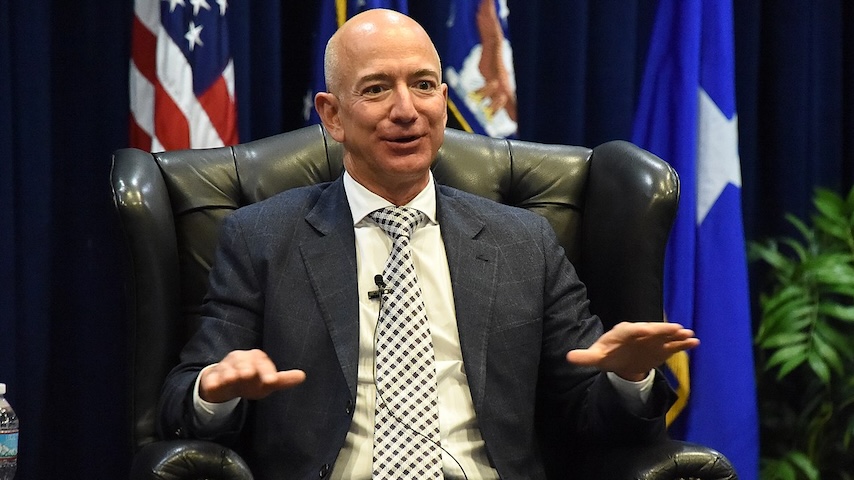Billionaire Newspaper Owners Crush Editorial Endorsements
Photo via Los Angeles Air Force Base Space and Missile System Center/Wikimedia Commons
Just days after Los Angeles Times owner Patrick Soon-Shiong caused a stir by quashing his newspaper’s endorsement of Kamala Harris, Washington Post owner Jeff Bezos has followed suit. On Friday, Post CEO and publisher William Lewis published a note explaining that the paper is “returning to our roots of not endorsing presidential candidates.”
Lewis spent a chunk of words quoting old reasoning from previous generations on why, in elections like that of 1960, the paper decided to stay above the fray. He just kind of stops at the election of Jimmy Carter, though, and ignores that last 40 years of endorsement precedent. It’s hard to avoid at least some resemblance of a “return to our roots” bromide — without any real explanation of why things were better Back Then — to a certain presidential candidate’s ubiquitous slogan, with its plausible deniability of when, exactly, things were Great before.
At the Post, the editorial board had apparently been ready with their endorsement until the billionaire thumb descended onto the scale. Publishing (in the Style section) just an hour or so after Lewis’s note went live, media reporters at the Post described the sequence of events:
An endorsement of Harris had been drafted by Post editorial page staffers but had yet to be published, according to two sources briefed on the sequence of events who spoke on the condition of anonymity because they were not authorized to speak publicly. The decision not to publish was made by The Post’s owner — Amazon founder Jeff Bezos — according to the same sources.
That reporting, that the very rich guy at the top said no, in all likelihood because he thinks Trump becoming president would keep him as rich or make him richer, makes Lewis’s explanations from an hour before all the more ridiculous. “Most of all, our job as the newspaper of the capital city of the most important country in the world is to be independent,” he wrote, apparently without a hint of irony.
As these billionaires begin to obey in advance, other outlets appear to understand the brief. “America deserves much more than an aspiring autocrat who ignores the law, is running to stay out of prison, and doesn’t care about anyone but himself,” wrote the Philadelphia Inquirer editorial board, on the same day as the Post’s decision to punt. “The better angels of our nature demand it.”
Scientific American, the longest-running magazine in the U.S., made a presidential endorsement for only the second time in its 179-year history. The Nation, while decrying the Biden administration’s record on Gaza and noting that the “positive case is harder to make” on foreign policy, wrote that the stakes are so obvious that “of course we endorse Harris over Trump.” Even the much-maligned New York Times, rife with questionable decision-making throughout this endless campaign, titled its endorsement “The Only Patriotic Choice for President” and opened with: “It is hard to imagine a candidate more unworthy to serve as president of the United States than Donald Trump.”
But if it needed more help in figuring out where to land this year, or whether it was worth landing anywhere at all, the Post could simply read its own words about this very candidate, for some added context. From 2016:
Republican presidential nominee Donald Trump is dreadful, that is true — uniquely unqualified as a presidential candidate. If we believed that Ms. Clinton were the lesser of two evils, we might well urge you to vote for her anyway — that is how strongly we feel about Mr. Trump.
Or after four years of a Trump presidency, but notably before the, uh, attempted coup, in 2020:
In order to expel the worst president of modern times, many voters might be willing to vote for almost anybody.
To be clear, the endorsements of these outlets aren’t likely to swing all that many votes. The capitulation of the billionaires who own them, though, suggests a super-wealthy leadership class that is at best open to and at worst salivating over the prospect of Trump returning to the White House. The idea that picking a side — in the opinion section — somehow betrays a newspaper’s role is prima facie absurdity, and says nothing good about anything that comes next.